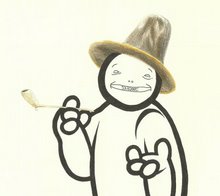✪ Foreknowlegde in martial history.
This is a character named Otto and he is fiddling with a scale-model of a WW1-Ardennes landscape. Apparently his soldiers are desperate enough to have a 1790-s Herschel telescope to assess their future with. They are waiting for the Moon to appear. Luckily Otto has made one.
Celestial divination has long been a part of martial traditions. Omens were not just recognized in the properties of celestial objects, but also in the entrails of herbivores, particularly the liver because of its likeness to clay tablets, and of course there were oracles, like the one at Delphi, where the Pythia was seated on a tripod inhaling strange vapors that rose from the ground, to make largely unintelligible predictions The emerging gases were said to be the breath of a slain dragon, but came from a dormant volcano on the site.
Divination played a big part in early medicine, to such an extent in fact, that all the great early astronomers were primarily trained as physicians. Their activities were at first practically indistinguishable from those performed by traditional healers such as druids and by saints.
Foreknowing dominated some cultures more than others. The Babylonians were obsessed by it because their Gods could be tricked or bribed. But to the Greeks, fate was something inevitable and tragic, undermining the confidence without which their empire dwindled.








No comments:
Post a Comment